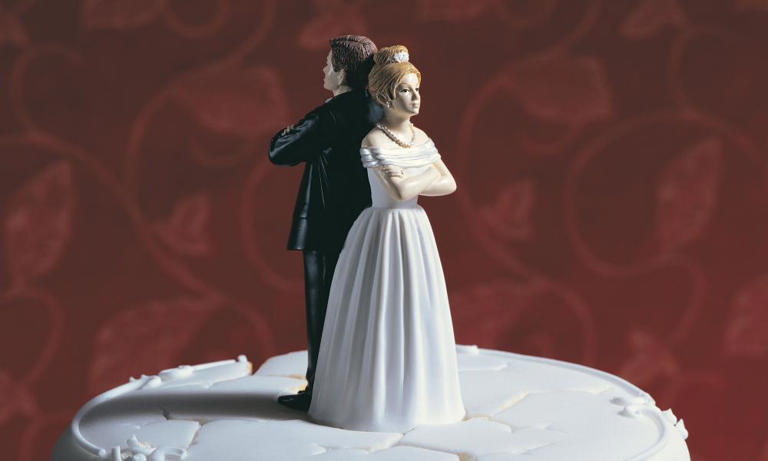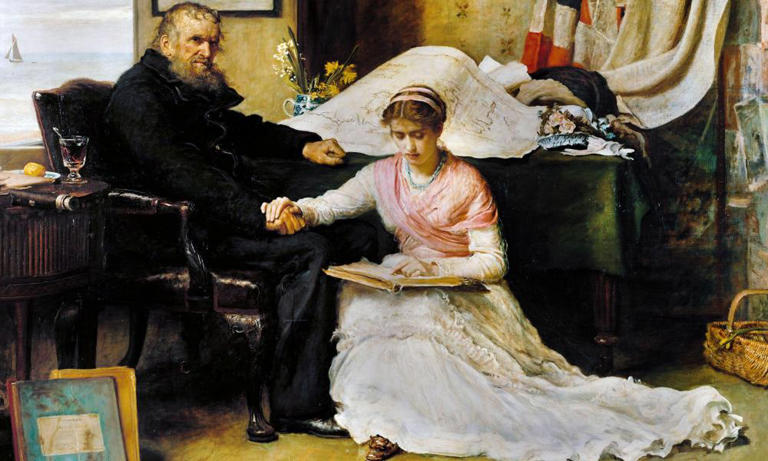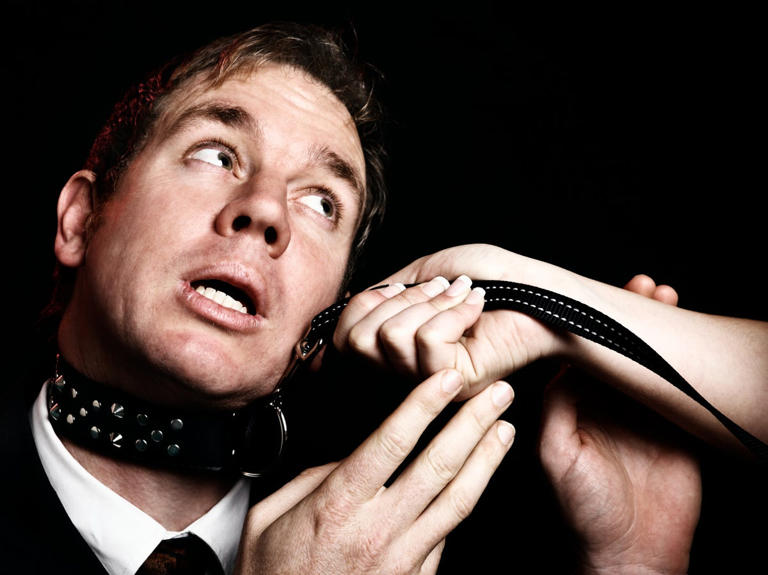It was coming up to closing time in the clothes shop where I worked, when in walked a handsome stranger. That jacket in the window,” he inquired, brown eyes twinkling. “Do you have it in my size?” Impeccably groomed, wearing a crisp white shirt with no tie, a suit and designer glasses, he exuded confidence. I loved meeting new people. After being made redundant from my pharmaceuticals job, I sold up and moved from Buckinghamshire to the Cotswolds town of Tetbury.
My two daughters, Lara and Emma, had flown the nest and, at 54, I was loving my independence following my divorce nine years earlier. As we chatted, Mark Conway – as he introduced himself – held my gaze and smiled. The atmosphere felt electric. So when my friend Uma popped in to tell me about a house she thought I should buy, I wished she’d leave so I could talk more to this charismatic Mark, who said he was 46 and divorced. Now I wish now I had closed the shop early and never met him.
Instead, after Uma had gone, I told Mark I’d sold my own place and was renting a cottage while looking to buy. Later, I realised this signalled how much cash I had at my fingertips.
He asked for my mobile number and the next evening we sipped champagne at a local hotel. After Eton and Oxford, Mark said he was now a tax exile working for a Swiss bank. When he said he’d flown back from Geneva that evening just to see me I was flattered.
His lifestyle sounded so luxurious. He liked only “the best” and happily paid for it. The first time we made love, two days after we met, Mark pulled himself away from me. “I’m falling in love with you,” he murmured. “This is insane.” Soon, we were calling each other by the pet name “Bubba”. “You are so beautiful,” he’d text. One evening, four days after we met, he pulled up outside a lovely empty house with electric gates.
He told me he was thinking of renting it for us. My jaw dropped. “We’re going to live together. It’s what we both want,” he said. But Mark was always flying off somewhere. He revealed that his banking job was actually a cover for his work with MI6.
This made sense. He’d “let slip” how he flew his own plane and spoke seven languages. He explained that secret agents weren’t supposed to have relationships and it would take him 18 months to get out of his MI6 contract. Would I wait for him? Hook, line and sinker, I’d fallen for him, and said I would.
Lies and spies
Mark went to great lengths to seem like a spy. He asked his driver to pull into a side street next to the MI6 building in Vauxhall, London. “Wait for me here,” he instructed, disappearing inside. He “bought” me a Volvo XC60 SUV – later I would discover it was leased – and gave me a new iPhone and laptop. Then Mark announced he wanted to buy a Grade I-listed house set in stunning grounds on the outskirts of Bath.
I was thrilled, although he wouldn’t let me visit until the renovations were complete. “I want it to be a surprise for you, Bubba,” he grinned. But less than a month after I’d met him I overheard him discussing a cash-flow problem regarding the contractors. Since I had money sitting in my bank account, I offered him the £26,000 he mentioned. It was the first of 70 transfers over the next few months. I wasn’t thinking straight. That’s what falling in love does to you.
His lies became more elaborate. He told me he knew Vladimir Putin and Hillary Clinton, and once interrupted our lovemaking to take a call he said was from the King of Spain. He’d pick me up for dates in a helicopter and everything was ridiculously expensive. At Harrods food hall he picked up a whole ham costing £1,500. Yet whenever we went to pay, he just looked straight at me and I produced my bankcard.
Mark promised me a fairy-tale wedding and to repay me once the cash-flow problem had been sorted. I never doubted him. Another time, in August 2012, Mark phoned. “Fancy going flying, Bubba?” He took me to see “his” collection of classic aircraft in Gloucestershire. It looked so romantic, but I was surprised to learn that I would be flown by Mark’s business associate, James Miller, even though Mark claimed to be an experienced pilot himself.
How could I doubt that he would one day pay back my money when impromptu treats like this were possible?
Desperate and depressed
One night, just as I was watching Homeland – a TV show I had become addicted to since Mark’s confession that he worked for MI6 – he suddenly appeared dressed in full desert combat gear. “Darling, I had to see you,” he said. “I’ve left a group of men I’m training in Syria.” Because I couldn’t talk to anyone about his work, I just became increasingly isolated.
Spending all my time alone, waiting to hear from him, I lost my confidence and slid into depression. Then that autumn, Mark told me he had a brain tumour and needed an urgent operation abroad. I was worried sick. Why was everything going so wrong? All the bills were in my name, but I couldn’t hassle Mark to give me any money when he was so sick. I ended up moving out of the house and relying on friends to put me up.
I didn’t want to live. I spent hours on the internet researching how I could commit suicide. But part of me clung to the hope that I was overreacting, and that my new life with Mark would be wonderful. By April 2013 there was still no money. Mark blamed his lawyers. He rang me every day, telling me he hoped we’d be together soon.
I tried to end the relationship, but he guilted and gaslighted me into staying with him. By June I’d had enough. In desperation, I rang James Miller – the plane pilot. I barely knew him but hoped for some reassurance. Instead, he dropped a bombshell. James said his business had been destroyed by Mark, a serial fraudster whose real surname was Acklom.
He’d made headlines in 1991 when, aged 16, he’d stolen his father’s credit card, flown to Paris by private jet and treated his friends to champagne. I remembered reading about it. He’d then embarked on a criminal career and had been jailed for fraud in the UK and Spain.
Also, he was married with two young children, one of whom he’d introduced to me as his “niece”. Plus, he wasn’t 46, only 38. Lie after lie – I felt sick I’d slept with him. And ashamed and horribly embarrassed I’d fallen for his charm and James Bond story.
That night, I went to my daughter Lara’s flat in London, where my younger daughter Emma joined us. I told them everything, trying to absorb it all. Lying on Lara’s sofa, I just wanted to die. “That f*****g b*****d!” Next morning, Mark rang. “Baby, I love you so much,” he said. “Just give me my money,” I replied. The line went dead and I never heard from Mark Acklom ever again.
I went to the police as soon as I could, but it took six years to bring Mark to justice in a British courtroom. With his name on the list of the UK’s Ten Most Wanted Fugitives, he was finally arrested in Switzerland and extradited back to the UK in February 2019. That August he appeared in court, pleading guilty to five charges of fraud. He was sentenced to five years and eight months.
I’ve since realised he is a psychopath – without remorse, guilt or empathy. I lost every penny of my £850,000. The one good thing was meeting James – we got together at the end of 2013 and now rent a home in Scotland. Our match was made in hell, but we have each other. Mark ruined both our lives, but we laugh about the audacious lies. What else can you do?
I always dreamed of writing a book. This is one story I could never have made up. Sleeping With A Psychopath by Carolyn Woods (HarperCollins £8.99) is out now
Reference: Mirror: Carolyn Woods (talking to Susanna Galton) 11 hrs ago










